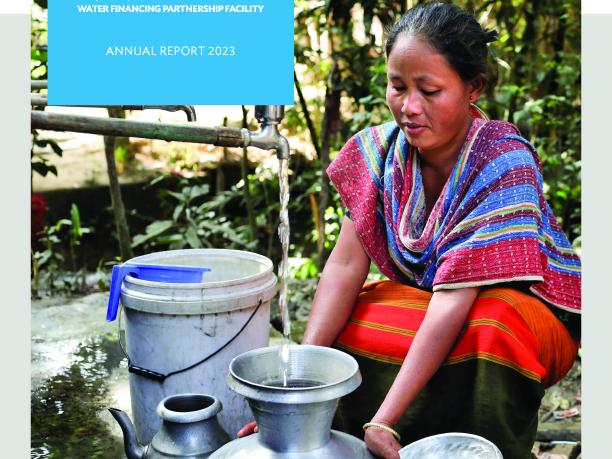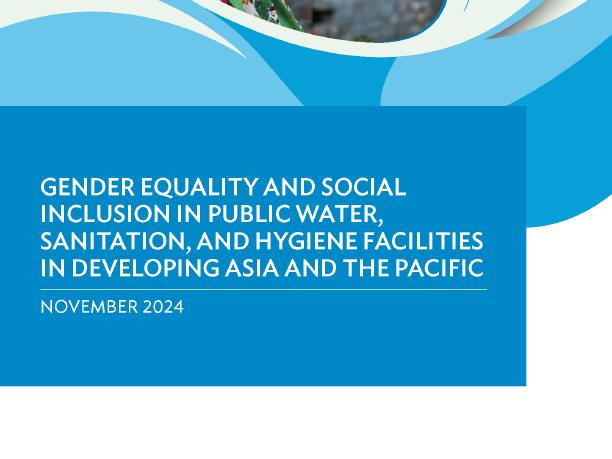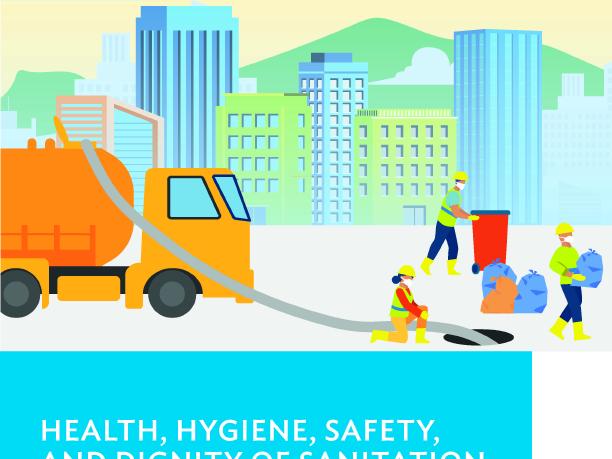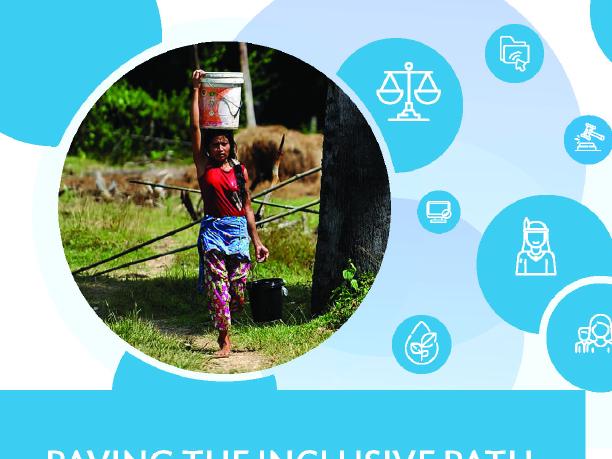
Water Financing Partnership Facility Progress Reports
The annual reports of the Water Financing Partnership Facility discuss results, achievements, and progress for each year, as it continues to support ADB’s water sector operations.
Listen to the article
The Water Financing Partnership Facility (WFPF) was established in December 2006 to mobilize additional financial and knowledge resources from development partners to support the implementation of ADB’s water financing program. Its initial focus was to support the achievement of targeted outcomes set for 2006–2010 and was subsequently adjusted and extended to 2020 following approval of ADB’s Water Operational Plan 2011–2020. Building on this experience, the facility continues to support ADB’s water-focused operations from 2021 onward, guided by the ADB Strategy 2030 Water Sector Directional Guide: A Water-Secure and Resilient Asia and the Pacific. It aims to aid in four areas of operational focus: (i) water as a sustainable resource, (ii) universal and safe water services, (iii) productive use of water in agriculture and energy, and (iv) reduced climate change and water-related disaster risks.
Approved allocations in 2024 amounted to $10.5 million. As of the end of 2024, the WFPF has helped deliver a total of $11.4 billion in water investments in 23 developing member countries, to benefit approximately 127 million people. Of this, around 67 million people are already reaping the benefits from completed projects, and nearly 60 million people are expected from ongoing water investments.
| Year Established | 2013 |
|---|---|
| Partner | Gates Foundation |
| Cumulative Contributions Committed | $27 million |
| Project Commitments This figure accounts for savings from closed projects. Project commitments may exceed contributions as investment income and gains from foreign exchange transactions are used for new projects. | |
| Grants | $6 million for 4 projects |
| Technical Assistance | $12 million for 15 TA projects |
| Direct Charges | $1.6 million for 13 activities |
The Sanitation Financing Partnership Trust Fund, or SFPTF, initially focused on innovative sanitation solutions to increase support for fecal sludge management through non-networked (non-sewered) sanitation and septage management. Since 2019, the focus has shifted to a more holistic approach through the citywide inclusive sanitation framework to increase access to appropriate sanitation systems, whether sewered or non-sewered, centralized or decentralized, including the required support to increase knowledge and capacity and improve governance.
| Year Established | 2006 |
|---|---|
| Partner | Australia (2007–2021), Austria (2008–present), Norway (2007–2017), Spain (2008–present), Switzerland (2011–2020) |
| Cumulative Contributions Committed | $56.8 million |
| Project Commitments This figure accounts for savings from closed projects. Project commitments may exceed contributions as investment income and gains from foreign exchange transactions are used for new projects. | |
| Grants | $3 million for 7 projects |
| Technical Assistance | $41.3 million for 100 TA projects |
| Direct Charges | $7.9 million for 114 activities |
The Water Innovation Trust Fund, or WITF, (previously Multi-donor Trust Fund) highlights WFPF’s focus on innovations for improved water resources management and water services delivery. It prioritizes activities designed to result in significantly more people with access to safe drinking water and improved sanitation, higher productivity and efficiency of irrigation and drainage services, more people with reduced risk of flooding and other water-related disaster risks; sustainable management of water resources; increased knowledge and capacity; and improved sector governance.
| Year Established | 2023 |
|---|---|
| Partner | Netherlands |
| Cumulative Contributions Committed | $20 million |
| Project Commitments This figure accounts for savings from closed projects. Project commitments may exceed contributions as investment income and gains from foreign exchange transactions are used for new projects. | |
| Technical Assistance | $7.8 million for 11 TA projects |
| Direct Charges | $900,000 for 4 activities |
Established as a separate multi-donor trust fund, the Water Resilience Trust Fund, or WRTF, aims to support critical and transformational actions by government agencies, communities, and the private sector that are needed to strengthen water resilience in Asia and the Pacific. It prioritizes projects and activities that focus on achieving local water and sanitation resilience, aligned with countries’ needs, national development priorities in the water sector, and sector plans for addressing climate change. Activities should (i) support capacity development in ADB’s developing member countries, (ii) help build knowledge base on water resilience, (iii) help create an enabling environment through improved policies and planning processes, and (iv) facilitate pipeline development for sovereign and nonsovereign water resilience projects.
| Year Established | 2006 |
|---|---|
| Partner | Netherlands |
| Cumulative Contributions Committed | $44.3 million |
| Project Commitments This figure accounts for savings from closed projects. Project commitments may exceed contributions as investment income and gains from foreign exchange transactions are used for new projects. | |
| Grants | $2.7 million for 3 projects |
| Technical Assistance | $36 million for 29 TA projects. |
| Direct Charges | $5.7 million for 47 activities |
The Netherlands Trust Fund under the Water Financing Partnership Facility was established in December 2006 and financially closed in December 2024. For 17 years, the trust fund supported ADB’s water sector operations through projects and activities designed to result in significantly more people with access to safe drinking water and improved sanitation, higher productivity and efficiency of irrigation and drainage services; more people with reduced risk of flooding and other water-related disasters; sustainable management of water resources; increased knowledge and capacity; improved sector governance; and increased focus on the water–food security nexus. The fund supported a total of 79 projects and activities through the four modalities for accessing the resources of the WFPF—three grant component of investments, two technical assistance (TA) linked to loan, 27 stand-alone TA, and 47 direct charges. Its support cut across lending and nonlending portfolios, both sovereign and nonsovereign, and covered all water subsectors across Asia and the Pacific.
The Netherlands Trust Fund was highly instrumental in WFPF’s key achievements as of the trust fund’s closing date on 31 December 2024, having been part of the WFPF since it commenced operation in 2007. With the trust fund’s support, the WFPF has helped deliver a total of 133 investment projects in 23 developing countries amounting to $11.4 billion to benefit around 127 million people, of which close to 67 million have already benefited from completed projects, and nearly 60 million more are expected to benefit from ongoing ones.
11 September 2024
ADB approved a $100 million support package for the Water Supply and Sanitation Reform Program in Sri Lanka, designed to help reform the country’s water supply and sanitation sector.
2 September 2024
ADB approved a $100 million financing support for Sri Lanka’s Water Supply and Sanitation Reform program sector reforms that will establish new national policies and strategies and their implementation.
Energy, transport, water, information and communication technology, and other infrastructure will benefit from an ADB program that pushes for improving asset management in the region.
This document outlines the outcomes of a pioneering training program on saline agriculture designed to provide adaptation strategies to help thousands of farmers of the Mekong Delta avoid substantial crop losses due to saline intrusion.
The Water Financing Partnership Facility has contributed to expanding access to improved water and sanitation services and water resource management, promoting gender equality and greater food security, contributing to environmental sustainability and reduced flood risk, and building climate change resilience.
Natural marshlands are critical to the 600 million people living in the Mekong basin. Under the Water Financing Partnership Facility, ADB is helping design, build, and commission an innovative fishway allowing unrestricted movement of many species between the That Luang Marsh and the Mekong River.
ADB, under the Sanitation Financing Partnership Trust Fund, and the Government of the Philippines are discussing the development of a project that improves sanitation services and enhances skills of the tourism workforce in top tourist destination Baguio City.
With funding support from the Water Financing Partnership Facility, the Building Climate Resilience of Watersheds in Mountain Eco-regions in Nepal project shows how to build long-term climate resilience in mountain regions, improving access to and reliability of water supply to the most vulnerable communities.
Bangladesh is preparing for a $100 million investment in climate and disaster resilient small-scale water resources management. The Water Financing Partnership Facility, through the Netherlands Trust Fund, is supporting the preparations.
In the Philippines, a pilot project to rehabilitate the Pasig River built community support around a low-cost waste management system.

The annual reports of the Water Financing Partnership Facility discuss results, achievements, and progress for each year, as it continues to support ADB’s water sector operations.

This publication offers recommendations that can be used for designing, implementing, and evaluating water, sanitation, and hygiene facilities in developing Asia and the Pacific, helping ensure that these facilities are socially and gender exclusive.

A comprehensive training manual tailored to the unique context and needs of sanitation and waste workers in Nepal’s cities to ensure their health and safety, and to dignify sanitation work.

This publication offers a comprehensive overview of the human rights–based approach (HRBA) in relation to the human rights to water and sanitation by presenting different legislation from the Asia and Pacific region aligned with HRBA principles.